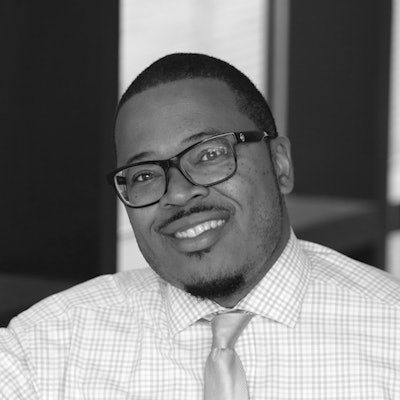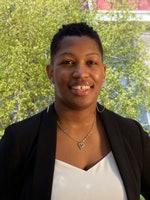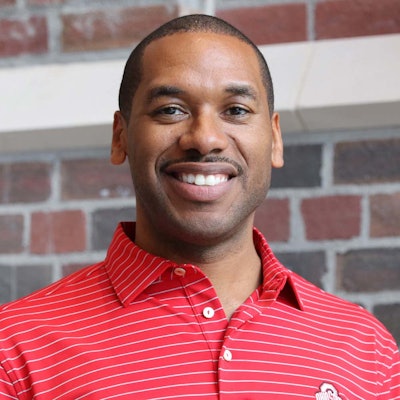We begin this discussion with a reality check. Only 11% of school counselors[1]are Black (ASCA, 2020; ttps://www.schoolcounselor.org/getmedia/9c1d81ab-2484-4615-9dd7-d788a241beaf/member-demographics.pdf). This low representation matters for a myriad of reasons discussed herein. The past couple of years have been fraught with a dual pandemic (racism and COVID-19). Yet, several states and educational institutions across the age span (P-12 and higher education) enacted legislation, rules, and/or sanctions banning discussions around race/racism, gender identity, and culture, all of which fall under the umbrella of critical race theory (https://www.edweek.org/leadership/what-is-critical-race-theory-and-why-is-it-under-attack/2021/05). These culturally assaultive decisions and acts were compounded by students of color adjusting to the new normal of being back in person for classroom instruction.  Dr. Erik Hines
Dr. Erik Hines
Black students have been impacted socially, academically, emotionally, and mentally by the previously mentioned issues, thus impeding their success and overall well-being. A cruel reality is that the research literature and anecdotal experiences have shown that many Black students do not receive equitable treatment in schools or have access to resources for academic success. They contend with racial trauma, unlike White classmates. Grounded in our individual and collective work as Black scholars who share the goal of dismantling academic and affective barriers, we believe that a meaningful solution to racial trauma (https://www.ptsd.va.gov/publications/rq_docs/V32N1.pdf) and racial battle fatigue (https://medium.com/racial-battle-fatigue/racial-battle-fatigue-what-is-it-and-what-are-the-symptoms-84f79f49ee1e) is to hire more Black school counselors to address the needs of and advocate for Black students. #representationmatters, as we now discuss. To be clear, the need for more Black counselors is also pressing because of our concerns about the scarcity of anti-racist and culturally competent school counselors.
Roles of School Counselors Overall and the Need for Black Counselors
The American School Counseling Association (ASCA, n.d.) notes that “school counselors are certified/licensed educators who improve student success for ALL students by implementing a comprehensive school counseling program” (p. 1). School counselors typically abide by the ASCA ethical standard, as well as engage in professional development or continuing education opportunities to enhance their career (ASCA, n.d.). School counselors have a unique skill set that differs from teachers in that they have the ability to use counseling in individual, group, and classroom settings with the goal of helping them be successful in the areas of academic achievement, mental/psychological health, and college and career readiness.
Over the last two decades, school counseling witnessed a much-needed transformation that focused on systemic changes that:
(a) eliminate barriers to student success and focus less on “fixing the student”;
(b) encourage speaking out against injustices such as anti-Black racism;
(c) focus on equitable educational outcomes for all students rather than being a gatekeeper of the status quo;
(d) prepare students for postsecondary opportunities and pathways; Dr. Donna Y. Ford
Dr. Donna Y. Ford
(e) encourage collaborating with teachers, administrators, families, community stakeholders rather than working solely with students; and
(f) use data to make informed decisions about how to best serve students (see https://edtrust.org/resource/the-new-vision-for-school-counselors-scope-of-the-work/ ) (Erford, 2019). In other words, school counselors are proactive and intentional about closing opportunity gaps (https://www.diverseeducation.com/opinion/article/15281714/culture-must-be-up-front-and-center-not-an-afterthought-in-counseling-black-and-other-minoritized-clients).
We maintain that school counselors must receive specialized training, such as equity, anti-racism and multicultural counseling skills, assessment and evaluation, and data-driven decision making to advocate for Black and other minoritized students and clients. These 21st century skill sets can assist Black students in feeling a sense of belonging/belongingness – welcomed in the school environment, along with being seen and heard by school counselors who share their cultural identities, and who can understand and empathize with the experiences they encounter around issues of race and social injustices. In other words, the lived experiences of school personnel are priceless in the counselor-client relationship. They enable Black school counselors to empathize with their students/clients and to use culturally responsive, data-driven strategies to identify the myriad of issues that hinder these same-race students from attaining the resources they need to optimize their achievement and mental health. Easton-Brooks’ scholarship on racial and ethnic matching with teachers and students (https://www.rgj.com/story/opinion/voices/2019/05/21/students-can-benefit-ethnic-matching-says-dean-unrs-college-education/3756154002/) equally appropriate to counselor-student/client relationships.  Dr. Tanya J. Middleton
Dr. Tanya J. Middleton
In this short treatise, we hone in on four urgent socio-emotional and psychological issues with racial battle fatigue as the underlying result or outcome. This fatigue is compounded by Black students not receiving the mental health support that they need. Black students fail to engage in helping relationships (i.e., counseling, support) largely due to historical (https://www.cdc.gov/tuskegee/timeline.htm) and contemporary mistrust (e..g., COVID) (https://ct.counseling.org/2020/07/black-mental-health-matters/ and https://www.psycom.net/black-mental-health-barriers) in the social systems that are embedded with racist ideologies and White hegemonic values. This is especially true when schools lack culturally competent counselors and Black school counselors who, through personal and professional experiences, recognize barriers to health seeking. Black students are at greater risk for experiencing adverse consequences that are linked to racial discrimination known to impact their academic, psychological, behavioral, social, and emotional functioning.
Moving Forward: Priming the Mental Health Pipeline
While not exhaustive, we offer several recommendations – low hanging fruit – for recruiting more Black school counselors:
1. Recruit from school counseling programs with a focus on cultural competence, anti-racism, and equity;
2. Encourage Black students to enter school counseling programs in high school as a pipeline to such programs in higher education;
3. Encouraging current teachers who have a desire to engage students beyond academics to explore school counseling as an option;
4. School counselor educators can work with university/college faculty and staff who oversee Black affinity spaces to discuss their programs and the benefits of being a school counselor;
5. Similar to teacher academies; create an educational academy within high schools that focus on developing student interest in school counseling; and
6. Collaborate with educator programs, such as Call Me Mister and PathwaysToTeaching to recruit Black and minoritized educators into school counseling.
It is our conviction that increasing the number and percentage of Black school counselors will significantly improve the academic, emotional, and social outcomes of Black students/clients. Like their White counterparts, Black clients/students will have advocates who can identify with and mitigate issues that often lead to traumatic and detrimental experiences that place them on a path to negative results such as dropping out, expulsions, forfeiting postsecondary opportunities, judicial system involvement, and even death. Dr. Edward Fletcher Jr.
Dr. Edward Fletcher Jr.
Black school counselors are also needed to train their colleagues on working effectively with Black students (https://www.diverseeducation.com/opinion/article/15281714/culture-must-be-up-front-and-center-not-an-afterthought-in-counseling-black-and-other-minoritized-clients) , especially in the areas of allyship (https://www.diverseeducation.com/authors/contact/15279733/james-l-moore-iii) – cultural responsiveness and compassion.
References
American School Counseling Association. (n.d.). The role of the school
counselor. https://www.schoolcounselor.org/getmedia/ee8b2e1b-d021-4575-982c-c84402cb2cd2/Role-Statement.pdf
American School Counseling Association. (2020). Member demographics.
Erford, B. T. (2019). Transforming the school counseling profession (5th ed.).
Merrill Prentice Hall.
https://librarypass.com/2022/09/12/using-graphic-novels-as-mentor-texts-for-personal-narratives/
https://ila.onlinelibrary.wiley.com/doi/10.1002/trtr.2145
ASCA: membership data to estimate number of Black school counselors: https://www.schoolcounselor.org/getmedia/9c1d81ab-2484-4615-9dd7-d788a241beaf/member-demographics.pdf
Why School Counselors of Color matter now more than ever: https://www.edweek.org/leadership/why-school-counselors-of-color-matter-more-than-ever/2022/01
[1] Based on ASCA member demographics which aligns with teacher and U.S. Census data
Dr. Erik M. Hines is associate professor and program coordinator of counselor education at Florida State University.
Dr. Donna Y. Ford is Distinguished Professor of Education and Human Ecology at The Ohio State University
Dr. Tanya J. Middleton is a clinical assistant professor in the Department of Educational Studies at The Ohio State University
Dr. Edward C. Fletcher Jr., is the Education and Human Ecology Distinguished Professor in the Department of Educational Studies at The Ohio State University.















